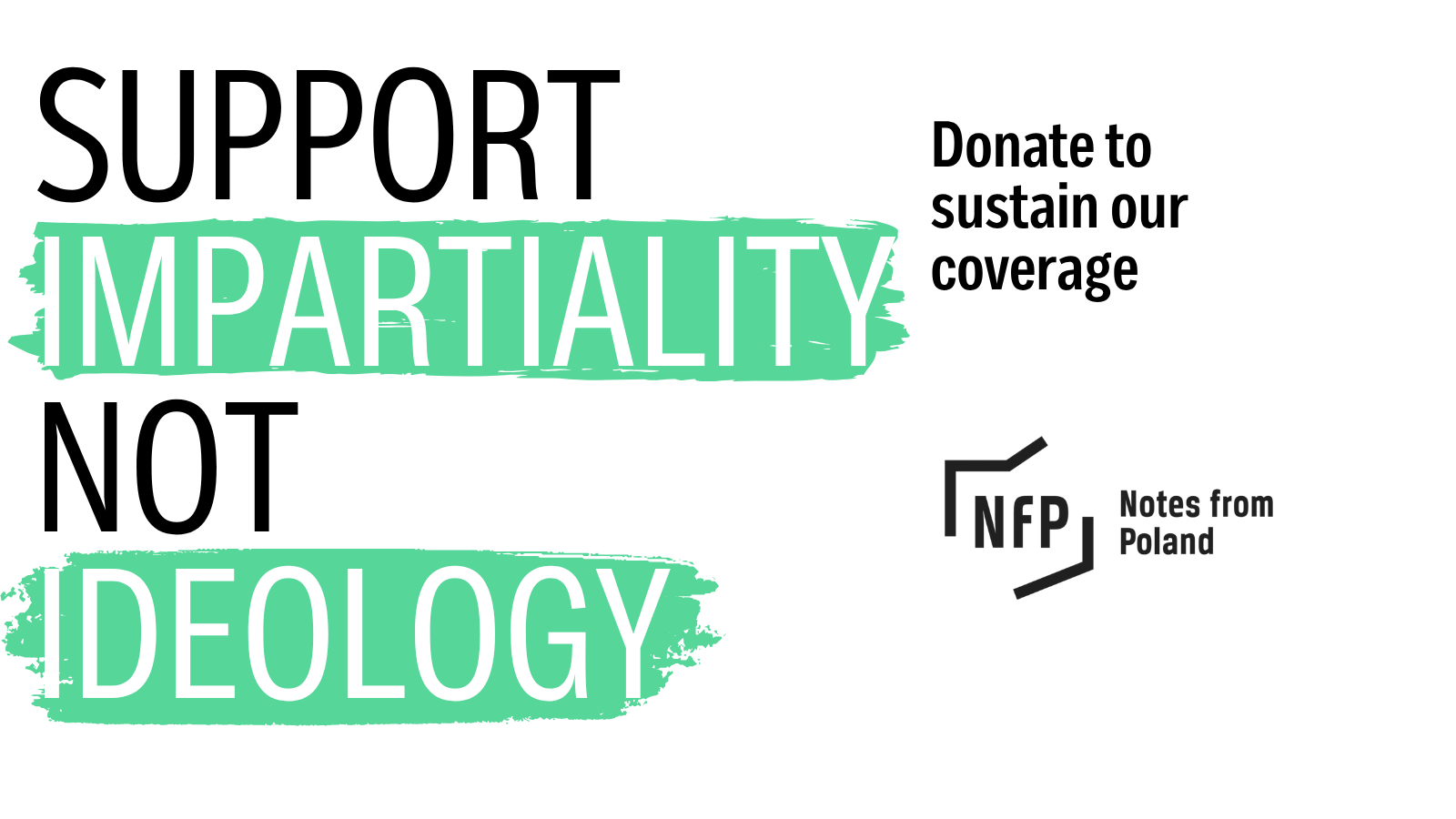Keep our news free from ads and paywalls by making a donation to support our work!

Notes from Poland is run by a small editorial team and is published by an independent, non-profit foundation that is funded through donations from our readers. We cannot do what we do without your support.
The government’s majority in parliament has approved plans by the finance ministry to increase taxes on alcohol, sweetened beverages, and energy drinks.
The ministry has presented the plans as a way to improve Poles’ health. However, critics of the taxes say they are simply a revenue-generating measure. The legislation in any case appears likely to be vetoed by opposition-aligned President Karol Nawrocki, who has pledged to oppose tax increases.
Sejm przegłosował podwyżkę opłaty cukrowej. Posłowie uchwalili nowelizację ustawy o zdrowiu publicznym oraz ustawy o podatku dochodowym od osób fizycznych. Stawki zostaną podniesione m. in. z 50 do 70 gr za litr napoju z cukrem do 5 g w litrze. Wyższa opłata ma zniechęcić do… pic.twitter.com/uEkmdpyFuG
— Sejm RP🇵🇱 (@KancelariaSejmu) November 7, 2025
On Friday, the Sejm, the more powerful lower house of parliament, approved an increase in the excise duty on alcohol by 15% next year and 10% in 2027 – much higher figures than the increases of 5% in each of those years currently written into law.
The measures would increase the price of a typical bottle of beer by 0.16 zloty (€0.04) and a bottle of vodka by 3 zloty (€0.71), reports the Dziennik Gazeta Prawna daily. The additional revenue generated would boost next year’s budget by 1.96 billion zloty, according to finance ministry calculations.
However, in its announcement of the tax increase, the ministry indicated that its primary aim is to “counteract the harmful effects of alcohol on the health of Poles”.
Meanwhile, the Sejm also approved an increase to the surcharge on sugary and artificially sweetened drinks that was introduced under the previous Law and Justice (PiS) government in 2021.
The fixed fee for drinks containing up to 5 grams of sugar per 100 millilitres, or any amount of artificial sweetener, would rise 40%, from 0.5 zloty to 0.7 zloty. The variable fee for each gram of sugar above 5 per 100 millilitres would double, from 0.05 zloty to 0.1 zloty.
The maximum fee per litre of such beverages will rise 50%, from 1.2 zloty to 1.8 zloty. Meanwhile, the fixed fee for drinks containing caffeine and/or taurine (substances typically used in energy drinks) would be raised tenfold, from 0.1 zloty to 1 zloty, reports broadcaster RMF.
According to calculations by Polskie Radio, the typical price of a two-litre bottle of Coca-Cola would rise almost 12% under the new system, from 9.49 zloty to 10.60 zloty.
Poland has introduced an extra fee for sugary and alcoholic drinks in order to improve public health
It will bring in around 3 billion zloty a year, but the government, which had promised not to increase taxes, argues it is technically a "surcharge" https://t.co/dgGfnt4Nc5
— Notes from Poland 🇵🇱 (@notesfrompoland) August 29, 2020
The finance ministry says that the increases are needed because the current levels of the fees are “insufficient to influence consumer behaviour” in the manner needed to fight the “growing problem of obesity”.
Both bills were supported in parliament by the ruling coalition, which ranges from left to centre right. However, they were opposed by the right-wing opposition, made up of the national-conservative PiS and far-right, free-market Confederation (Konfederacja).
Nawrocki, who is aligned with PiS, appears likely to exercise his right to veto the bills. In August, his chief of staff, Zbigniew Bogucki, told broadcaster Radio Zet that the president would not sign off on increased taxes on alcoholic or sweet drinks, in keeping with his campaign promise to oppose tax rises.
Przepisy zawierają furtki, z których skorzystała większość producentów ➡️ https://t.co/xsy2wDiLaB pic.twitter.com/EeTT3kttf9
— Business Insider Polska 🇵🇱 (@BIPolska) November 10, 2025
A number of experts have also criticised the way that the surcharge on sweet drinks has become not a means of improving health, as was originally claimed, but rather another tool for the government to increase tax revenue.
Earlier this year, the Supreme Audit Office (NIK) reported that the fees, which also apply to strong alcohol sold in small bottles, had raised 5.2 billion zloty for the National Health Fund (NFZ) between 2021, when they were introduced, and 2023.
However, instead of that money being channelled specifically towards programmes and treatments relating to combating the negative health effects of sweet drinks and alcohol, as was intended, it was instead used as a source of general funding for the health service.
Lewiatan Confederation, a leading business lobby group, in September said that it “strongly opposes the proposed very steep increase” in the sugar tax. “Unfortunately, past experience shows that the true purpose is to generate additional budget revenue”, not support healthcare, it wrote.
❌ Krytycznie oceniamy plany podwyżek podatku akcyzowego od alkoholu i opłaty cukrowej 🍬🥃
📈 Wzrost stawek akcyzy nie przynosi oczekiwanych wpływów budżetowych
❎ Prawdziwy cel podatku cukrowego to dodatkowe wpływy, a nie troska o zdrowie obywateli
👉 https://t.co/69L5t9g5qt pic.twitter.com/tGxu4FIubR
— Konfederacja Lewiatan (@Konf_Lewiatan) September 29, 2025
Meanwhile, Łukasz Mazur, a tax advisor who was one of the originators of the idea of a tax on unhealthy products a decade ago, told news website Onet that the implementation has moved completely away from the initial conception.
“The fee was intended to encourage companies to offer Poles healthier products,” said Mazur – for example, by taxing ingredients like high-fructose corn syrup and palm oil.
But the actual tax that has been introduced “is a joke” that “has nothing to do with healthcare”, he added. “The sole purpose is to increase budget revenues”, especially when, as now, “there’s a budget crunch and money needs to be found”.
The government has outlined a plan to reduce Poland's deficit after the country was this year placed under the EU’s excessive deficit procedure.
It foresees the deficit – which stood at 5.1% of GDP last year – falling below the EU target of 3% in 2028 https://t.co/FCvX0kHhn2
— Notes from Poland 🇵🇱 (@notesfrompoland) October 10, 2024
Poland has seen its budget deficits spiral amid growing spending on defence procurement and social welfare. Last year, the country was placed under the EU’s excessive deficit procedure, requiring it to set out a plan to better balance spending and revenue.
However, recently published data from Eurostat show that Poland recorded the EU’s second-fastest annual rise in public debt in the second quarter of this year.
The government is also seeking to raise revenue by increasing the rate of corporate income tax paid by banks. That measure was last month approved by parliament, again with the right-wing opposition voting against it.
However, Bogucki has suggested that, in this particular case, Nawrocki may be willing to approve the bill, saying that the president’s pledge not to raise taxes “applies to ordinary Poles, small Polish businesses”, whereas with “large entities with enormous resources the situation is somewhat different”.
Poland has recorded the EU’s second-fastest annual increase in public debt, new @EU_Eurostat data show.
The country has been running sizeable budget deficits in recent years as it boosts social spending and ramps up defence investment https://t.co/jjEqAJALl8
— Notes from Poland 🇵🇱 (@notesfrompoland) October 23, 2025

Notes from Poland is run by a small editorial team and published by an independent, non-profit foundation that is funded through donations from our readers. We cannot do what we do without your support.
Main image credit: Rollz International/Pexels

Daniel Tilles is editor-in-chief of Notes from Poland. He has written on Polish affairs for a wide range of publications, including Foreign Policy, POLITICO Europe, EUobserver and Dziennik Gazeta Prawna.




















